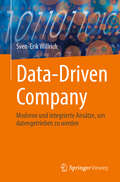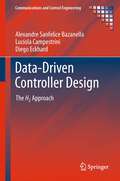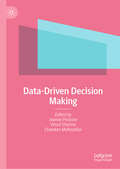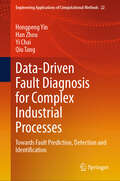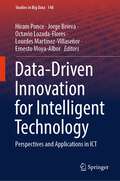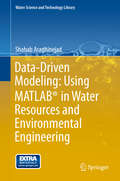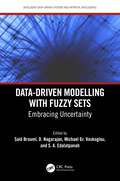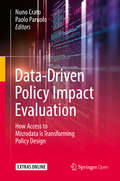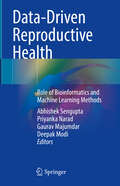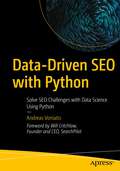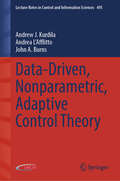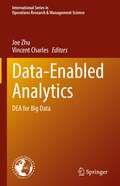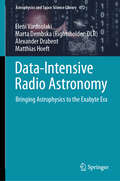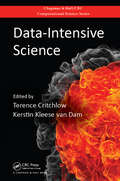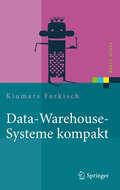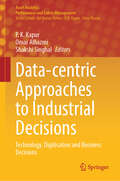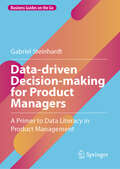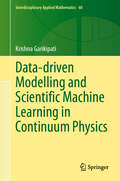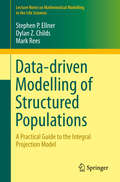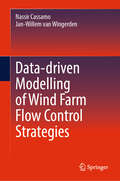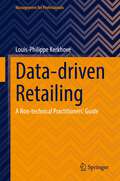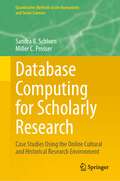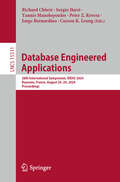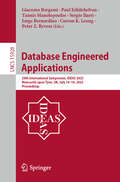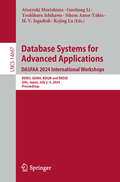- Table View
- List View
Data-Driven Company: Moderne und integrierte Ansätze, um datengetrieben zu werden
by Sven-Erik WillrichDaten werden für Unternehmen immer wichtiger. Gleichzeitig mangelt es an Best Practices und Leitfäden, wie klassische mit modernen Ansätzen wie Data Mesh oder Data Fabric zu einem anwendbaren Framework integriert werden können. Hierzu werden die Themen Organisationsdesign, Datenstrategie / -management und Enterprise Architecture auf theoretische und pragmatische Weise verbunden. Das Buch präsentiert Ziele, ein Data Operating Model sowie datenstrategische Ansätze für eine Data-Driven Company. Hervorzuheben sind dabei die zahlreichen Abbildungen aus diesem Buch, die die komplexen Zusammenhänge anschaulich machen und das Lesen unterstützen. Zielgruppe Mit diesen Inhalten richtet sich das Buch an Führungskräfte, Experten, Berater und weitere Personen, die einen Bezug zur IT und Daten haben beziehungsweise diesen entwickeln möchten. Durch den niedrigschwelligen Einstieg und gleichzeitigen Tiefgang in die ausgewählten Themen adressiert es sowohl Einsteiger als auch erfahrene Datenexperten. Autor Dr. Sven-Erik Willrich ist ein erfahrener Experte im Bereich IT und Datenmanagement. Mit seinem Hintergrund in Wirtschaftsinformatik und langjähriger Beratungserfahrung bringt er sowohl theoretisches Wissen als auch praxisorientierte Lösungsansätze ein. Als Dozent und Redner im Bereich Digitalisierung teilt er regelmäßig seine Expertise.
Data-Driven Controller Design: The H2 Approach (Communications and Control Engineering)
by Lucíola Campestrini Diego Eckhard Alexandre Sanfelice BazanellaData-Based Controller Design presents a comprehensive analysis of data-based control design. It brings together the different data-based design methods that have been presented in the literature since the late 1990's. To the best knowledge of the author, these data-based design methods have never been collected in a single text, analyzed in depth or compared to each other, and this severely limits their widespread application. In this book these methods will be presented under a common theoretical framework, which fits also a large family of adaptive control methods: the MRAC (Model Reference Adaptive Control) methods. This common theoretical framework has been developed and presented very recently. The book is primarily intended for PhD students and researchers - senior or junior - in control systems. It should serve as teaching material for data-based and adaptive control courses at the graduate level, as well as for reference material for PhD theses. It should also be useful for advanced engineers willing to apply data-based design. As a matter of fact, the concepts in this book are being used, under the author's supervision, for developing new software products in a automation company. The book will present simulation examples along the text. Practical applications of the concepts and methodologies will be presented in a specific chapter.
Data-Driven Decision Making
by Vinod Sharma Chandan Maheshkar Jeanne PouloseThis book delves into contemporary business analytics techniques across sectors for critical decision-making. It combines data, mathematical and statistical models, and information technology to present alternatives for decision evaluation. Offering systematic mechanisms, it explores business contexts, factors, and relationships to foster competitiveness. Beyond managerial perspectives, it includes contributions from professionals, academics, and scholars worldwide, delivering comprehensive knowledge and skills through diverse viewpoints, cases, and applications of analytical tools. As an international business science reference, it targets professionals, academics, researchers, doctoral scholars, postgraduate students, and research organizations seeking a nuanced understanding of modern business analytics.
Data-Driven Fault Diagnosis for Complex Industrial Processes: Towards Fault Prediction, Detection and Identification (Engineering Applications of Computational Methods #22)
by Yi Chai Han Zhou Hongpeng Yin Qiu TangThis book summarizes techniques of fault prediction, detection, and identification, all included specifically in the data-driven fault diagnosis requirements within industrial processes, drawing from the combination of data science, machine learning, and domain-specific expertise. In the modern industrial processes, where efficiency, productivity, and safety stand as paramount pillars, the pursuit of fault diagnosis has become more crucial than ever. The widespread use of computer systems, along with new sensor hardware, generates significant quantities of real-time process data. It has been frequently asked what could be done with both the real-time and archived historical data, to not only promising efficiency but providing prospect of a brighter, more resilient future. This book starts with the definition, related work, and open test-bed for industrial process fault diagnosis. Then, it presents several data-driven methods on fault prediction, fault detection, and fault diagnosis, with consideration of properties of industrial processes, such as varying operation modes, non-Gaussian, nonlinearity. It distills cutting-edge methodologies and insights which may inspire for industrial practitioners, researchers, and academicians alike.
Data-Driven Innovation for Intelligent Technology: Perspectives and Applications in ICT (Studies in Big Data #148)
by Jorge Brieva Lourdes Martínez-Villaseñor Hiram Ponce Ernesto Moya-Albor Octavio Lozada-FloresThis book focuses on new perspectives and applications of data-driven innovation technologies, applied artificial intelligence, applied machine learning and deep learning, data science, and topics related to transforming data into value.It includes theory and use cases to help readers understand the basics of data-driven innovation and to highlight the applicability of the technologies. It emphasizes how the data lifecycle is applied in current technologies in different business domains and industries, such as advanced materials, healthcare and medicine, resource optimization, control and automation, among others.This book is useful for anyone interested in data-driven innovation for smart technologies, as well as those curious in implementing cutting-edge technologies to solve impactful artificial intelligence, data science, and related information technology and communication problems.
Data-Driven Modeling: Using MATLAB® in Water Resources and Environmental Engineering (Water Science and Technology Library #67)
by Shahab Araghinejad"Data-Driven Modeling: Using MATLAB® in Water Resources and Environmental Engineering" provides a systematic account of major concepts and methodologies for data-driven models and presents a unified framework that makes the subject more accessible to and applicable for researchers and practitioners. It integrates important theories and applications of data-driven models and uses them to deal with a wide range of problems in the field of water resources and environmental engineering such as hydrological forecasting, flood analysis, water quality monitoring, regionalizing climatic data, and general function approximation. The book presents the statistical-based models including basic statistical analysis, nonparametric and logistic regression methods, time series analysis and modeling, and support vector machines. It also deals with the analysis and modeling based on artificial intelligence techniques including static and dynamic neural networks, statistical neural networks, fuzzy inference systems, and fuzzy regression. The book also discusses hybrid models as well as multi-model data fusion to wrap up the covered models and techniques. The source files of relatively simple and advanced programs demonstrating how to use the models are presented together with practical advice on how to best apply them. The programs, which have been developed using the MATLAB® unified platform, can be found on extras. springer. com. The main audience of this book includes graduate students in water resources engineering, environmental engineering, agricultural engineering, and natural resources engineering. This book may be adapted for use as a senior undergraduate and graduate textbook by focusing on selected topics. Alternatively, it may also be used as a valuable resource book for practicing engineers, consulting engineers, scientists and others involved in water resources and environmental engineering.
Data-Driven Modelling with Fuzzy Sets: Embracing Uncertainty (Intelligent Data-Driven Systems and Artificial Intelligence)
by Said Broumi D. Nagarajan Michael Gr. Voskoglou S. A. EdalatpanahZadeh introduced in 1965 the theory of fuzzy sets, in which truth values are modelled by numbers in the unit interval [0, 1], for tackling mathematically the frequently appearing in everyday life partial truths. In a second stage, when membership functions were reinterpreted as possibility distributions, fuzzy sets were extensively used to embrace uncertainty modelling. Uncertainty is defined as the shortage of precise knowledge or complete information and possibility theory is devoted to the handling of incomplete information. Zadeh articulated the relationship between possibility and probability, noticing that what is probable must preliminarily be possible. Following the Zadeh’s fuzzy set, various generalizations (intuitionistic, neutrosophic, rough, soft sets, etc.) have been introduced enabling a more effective management of all types of the existing in real world uncertainty. This book presents recent theoretical advances and applications of fuzzy sets and their extensions to Science, Humanities and Education.This book: Presents a qualitative assessment of big data in the education sector using linguistic Quadri partitioned single valued neutrosophic soft sets. Showcases application of n-cylindrical fuzzy neutrosophic sets in education using neutrosophic affinity degree and neutrosophic similarity Index. Covers scientific evaluation of student academic performance using single value neutrosophic Markov chain. Illustrates multi-granulation single-valued neutrosophic probabilistic rough sets for teamwork assessment. Examines estimation of distribution algorithm based on multiple attribute group decision-making to evaluate teaching quality. It is primarily written for Senior undergraduate and graduate students and academic researchers in the fields of electrical engineering, electronics and communication engineering, computer science and engineering.
Data-Driven Policy Impact Evaluation: How Access to Microdata is Transforming Policy Design
by Nuno Crato Paolo ParuoloIn the light of better and more detailed administrative databases, this open access book provides statistical tools for evaluating the effects of public policies advocated by governments and public institutions. Experts from academia, national statistics offices and various research centers present modern econometric methods for an efficient data-driven policy evaluation and monitoring, assess the causal effects of policy measures and report on best practices of successful data management and usage. Topics include data confidentiality, data linkage, and national practices in policy areas such as public health, education and employment. It offers scholars as well as practitioners from public administrations, consultancy firms and nongovernmental organizations insights into counterfactual impact evaluation methods and the potential of data-based policy and program evaluation.
Data-Driven Reproductive Health: Role of Bioinformatics and Machine Learning Methods
by Gaurav Majumdar Abhishek Sengupta Priyanka Narad Deepak ModiThis book provides insight into the transformative impact of data-driven approaches on reproductive health. Chapters cover a wealth of intricate algorithms of genomic analysis, predictive modeling, and personalized treatment strategies, providing an up-to-date view of the reproductive healthcare landscape. With more than 20 code-based examples, the book decodes complex biological data using bioinformatics and machine learning and provides valuable insights into fertility, genetic disorders, and personalized medicine. This book is relevant for healthcare professionals, researchers, and students in the fields of reproductive medicine, bioinformatics, and genetics.
Data-Driven SEO with Python: Solve SEO Challenges with Data Science Using Python
by Andreas VoniatisSolve SEO problems using data science. This hands-on book is packed with Python code and data science techniques to help you generate data-driven recommendations and automate the SEO workload. This book is a practical, modern introduction to data science in the SEO context using Python. With social media, mobile, changing search engine algorithms, and ever-increasing expectations of users for super web experiences, too much data is generated for an SEO professional to make sense of in spreadsheets. For any modern-day SEO professional to succeed, it is relevant to find an alternate solution, and data science equips SEOs to grasp the issue at hand and solve it. From machine learning to Natural Language Processing (NLP) techniques, Data-Driven SEO with Python provides tried and tested techniques with full explanations for solving both everyday and complex SEO problems.This book is ideal for SEO professionals who want to take their industry skills to the next level and enhance their business value, whether they are a new starter or highly experienced in SEO, Python programming, or both. What You'll LearnSee how data science works in the SEO contextThink about SEO challenges in a data driven wayApply the range of data science techniques to solve SEO issuesUnderstand site migration and relaunches areWho This Book Is ForSEO practitioners, either at the department head level or all the way to the new career starter looking to improve their skills. Readers should have basic knowledge of Python to perform tasks like querying an API with some data exploration and visualization.
Data-Driven, Nonparametric, Adaptive Control Theory (Lecture Notes in Control and Information Sciences #495)
by Andrew J. Kurdila Andrea L'Afflitto John A. BurnsData-Driven, Nonparametric, Adaptive Control Theory introduces a novel approach to the control of deterministic, nonlinear ordinary differential equations affected by uncertainties. The methods proposed enforce satisfactory trajectory tracking despite functional uncertainties in the plant model. The book employs the properties of reproducing kernel Hilbert (native) spaces to characterize both the functional space of uncertainties and the controller's performance. Classical control systems are extended to broader classes of problems and more informative characterizations of the controllers’ performances are attained. Following an examination of how backstepping control and robust control Lyapunov functions can be ported to the native setting, numerous extensions of the model reference adaptive control framework are considered. The authors’ approach breaks away from classical paradigms in which uncertain nonlinearities are parameterized using a regressor vector provided a priori or reconstructed online. The problem of distributing the kernel functions that characterize the native space is addressed at length by employing data-driven methods in deterministic and stochastic settings. The first part of this book is a self-contained resource, systematically presenting elements of real analysis, functional analysis, and native space theory. The second part is an exposition of the theory of nonparametric control systems design. The text may be used as a self-study book for researchers and practitioners and as a reference for graduate courses in advanced control systems design. MATLAB® codes, available on the authors’ website, and suggestions for homework assignments help readers appreciate the implementation of the theoretical results.
Data-Enabled Analytics: DEA for Big Data (International Series in Operations Research & Management Science #312)
by Joe Zhu Vincent CharlesThis book explores the novel uses and potentials of Data Envelopment Analysis (DEA) under big data. These areas are of widespread interest to researchers and practitioners alike. Considering the vast literature on DEA, one could say that DEA has been and continues to be, a widely used technique both in performance and productivity measurement, having covered a plethora of challenges and debates within the modelling framework.
Data-Intensive Radio Astronomy: Bringing Astrophysics to the Exabyte Era (Astrophysics and Space Science Library #472)
by Eleni Vardoulaki Marta Dembska Alexander Drabent Matthias HoeftRadio astronomy is irreversibly moving towards the exabyte era. In the advent of all-sky radio observations, efficient tools and methods to manage the large data volume generated have become imperative. This book brings together the knowledge of several different research fields to present an overview of current state-of-the-art methods in data-intensive radio astronomy. Its approach is comprehensive and data-centric, offering a coherent look at the four distinct parts of the data lifecycle: Data creation, storage and archivesData processingPost-processing and data analysisData access and reuse Large data management has been the topic of discussion within the astronomical community for decades. Some relevant areas explored in this volume are: ongoing technological innovations in interferometers and computing facilities; difficulties and possible solutions for the huge processing demands of radio telescope projects such as LOFAR, MeerKat, ASKAP; concepts for reliable and fast storage for archiving; and more. Written by experts across astrophysics, high-energy particle physics, data science, and computer science, this volume will help researchers and advanced students better understand the current state of data-intensive radio astronomy and tackle the major problems that may arise from future instruments.
Data-Intensive Science (Chapman And Hall/crc Computational Science Ser. #18)
by Terence Critchlow Kerstin Kleese Van DamData-intensive science has the potential to transform scientific research and quickly translate scientific progress into complete solutions, policies, and economic success. But this collaborative science is still lacking the effective access and exchange of knowledge among scientists, researchers, and policy makers across a range of disciplines. Bringing together leaders from multiple scientific disciplines, Data-Intensive Science shows how a comprehensive integration of various techniques and technological advances can effectively harness the vast amount of data being generated and significantly accelerate scientific progress to address some of the world's most challenging problems. In the book, a diverse cross-section of application, computer, and data scientists explores the impact of data-intensive science on current research and describes emerging technologies that will enable future scientific breakthroughs. The book identifies best practices used to tackle challenges facing data-intensive science as well as gaps in these approaches. It also focuses on the integration of data-intensive science into standard research practice, explaining how components in the data-intensive science environment need to work together to provide the necessary infrastructure for community-scale scientific collaborations. Organizing the material based on a high-level, data-intensive science workflow, this book provides an understanding of the scientific problems that would benefit from collaborative research, the current capabilities of data-intensive science, and the solutions to enable the next round of scientific advancements.
Data-Warehouse-Systeme kompakt: Aufbau, Architektur, Grundfunktionen (Xpert.press)
by Kiumars FarkischIn dem Buch werden Data-Warehouse-Systeme als einheitliche, zentrale, vollständige, historisierte und analytische IT-Plattform untersucht und ihre Rolle für die Datenanalyse und für Entscheidungsfindungsprozesse dargestellt. Dabei behandelt der Autor die einzelnen Komponenten, die für den Aufbau, die Architektur und den Betrieb eines Data-Warehouse-Systems von Bedeutung sind. Die multidimensionale Datenmodellierung, der ETL-Prozess und Analysemethoden werden erörtert und Maßnahmen zur Performancesteigerung von Data-Warehouse-Systemen diskutiert.
Data-centric Approaches to Industrial Decisions: Technology, Digitisation and Business Decisions (Asset Analytics)
by P. K. Kapur Omar Alhazmi Shakshi SinghalThis book explores mathematical modeling, predictive analytics, and interdisciplinary tools in formulating, implementing, and evaluating industrial strategies. This book presents cutting-edge research that intersects advanced computational techniques with practical decision-making across industries. This edited book showcases a curated collection of peer-reviewed contributions from international scholars and practitioners, addressing the growing complexity of business decisions in the era of big data, AI, and digital transformation. From cyber-physical systems to sustainability analytics and business intelligence, each chapter provides a robust academic foundation while offering real-world implications for policymakers, managers, and researchers. With a focus on actionable insights, the book is a vital reference for operations research, analytics, and digital strategy professionals and an enriching resource for postgraduate and doctoral scholars across business and engineering disciplines.
Data-driven Decision-making for Product Managers: A Primer to Data Literacy in Product Management (Business Guides on the Go)
by Gabriel SteinhardtThis book is an essential guide for product managers seeking to harness the power of data to drive their product decisions. It is a detailed resource for developing and maintaining data literacy, a core skill for product managers. Through a structured approach supported by practical insights and illustrative examples, readers will learn to prioritize decisions based on quantitative data rather than intuition, understand core data concepts, and analyze and leverage data effectively. Product managers will discover how data can transform decision-making processes, enabling evidence-based selection, prioritization, and resource allocation for product features. By using customer feedback, user behavior data, market research, and performance metrics, product managers can foster a culture that leverages data to create successful products. This introductory primer and reference guide is indispensable for product managers aiming to integrate data-driven methodologies into their practice, ensuring their decisions are informed, strategic, and impactful.
Data-driven Modelling and Scientific Machine Learning in Continuum Physics (Interdisciplinary Applied Mathematics #60)
by Krishna GarikipatiThis monograph takes the reader through recent advances in data-driven methods and machine learning for problems in science—specifically in continuum physics. It develops the foundations and details a number of scientific machine learning approaches to enrich current computational models of continuum physics, or to use the data generated by these models to infer more information on these problems. The perspective presented here is drawn from recent research by the author and collaborators. Applications drawn from the physics of materials or from biophysics illustrate each topic. Some elements of the theoretical background in continuum physics that are essential to address these applications are developed first. These chapters focus on nonlinear elasticity and mass transport, with particular attention directed at descriptions of phase separation. This is followed by a brief treatment of the finite element method, since it is the most widely used approach to solve coupled partial differential equations in continuum physics. With these foundations established, the treatment proceeds to a number of recent developments in data-driven methods and scientific machine learning in the context of the continuum physics of materials and biosystems. This part of the monograph begins by addressing numerical homogenization of microstructural response using feed-forward as well as convolutional neural networks. Next is surrogate optimization using multifidelity learning for problems of phase evolution. Graph theory bears many equivalences to partial differential equations in its properties of representation and avenues for analysis as well as reduced-order descriptions--all ideas that offer fruitful opportunities for exploration. Neural networks, by their capacity for representation of high-dimensional functions, are powerful for scale bridging in physics--an idea on which we present a particular perspective in the context of alloys. One of the most compelling ideas in scientific machine learning is the identification of governing equations from dynamical data--another topic that we explore from the viewpoint of partial differential equations encoding mechanisms. This is followed by an examination of approaches to replace traditional, discretization-based solvers of partial differential equations with deterministic and probabilistic neural networks that generalize across boundary value problems. The monograph closes with a brief outlook on current emerging ideas in scientific machine learning.
Data-driven Modelling of Structured Populations: A Practical Guide to the Integral Projection Model (Lecture Notes on Mathematical Modelling in the Life Sciences)
by Mark Rees Stephen P. Ellner Dylan Z. ChildsThis book is a "How To" guide formodeling population dynamics using Integral Projection Models (IPM) startingfrom observational data. It is written by a leading research team in this areaand includes code in the R language (in the text and online) to carry out allcomputations. The intended audience are ecologists, evolutionary biologists,and mathematical biologists interested in developing data-driven models foranimal and plant populations. IPMs may seem hard as they involve integrals. Theaim of this book is to demystify IPMs, so they become the model of choice forpopulations structured by size or other continuously varying traits. The bookuses real examples of increasing complexity to show how the life-cycle of thestudy organism naturally leads to the appropriate statistical analysis, whichleads directly to the IPM itself. A wide range of model types and analyses arepresented, including model construction, computational methods, and theunderlying theory, with the more technical material in Boxes and Appendices. Self-contained R code which replicates all of the figures and calculationswithin the text is available to readers on GitHub. Stephen P. Ellner is Horace White Professor of Ecology and Evolutionary Biology at Cornell University, USA; Dylan Z. Childs is Lecturer and NERC Postdoctoral Fellow in the Department of Animal and Plant Sciences at The University of Sheffield, UK; Mark Rees is Professor in the Department of Animal and Plant Sciences at The University of Sheffield, UK.
Data-driven Modelling of Wind Farm Flow Control Strategies
by Nassir Cassamo Jan-Willen van WingerdenThis book presents data-driven algorithms used in the context of wind farm modelling and exploits their relation with concepts from non-linear dynamical system theory. The algortihms include Input Output Dynamic Mode Decomposition and their combination with the Koopman Operator theory. The latter improves on modelling and analysis of the aerodynamic interaction between wind turbines in wind farms and assists in uncovering insights into the existing dynamics and improves models accuracy. The authors introduce the topic of wind farm flow control, illustrating current strategies devised to overcome power losses in wind plants due to the aerodynamic interaction between turbines. Although controlling wind farms as a whole is becoming increasingly important, the high dimensions and governing non-linear dynamics inherent of wind farm systems make the design of numerical optimal controllers computationally expensive. This book describes a possible pathway to circumvent this challenge through reduced order models that can embed the existing non-linearities. The authors make use of high fidelity open-source simulation datasets and developed algorithms to fully show the potential of this approach using visual results. The reader is motivated to use the datasets and algorithms and exploit the potential of the reduced order models.
Data-driven Retailing: A Non-technical Practitioners' Guide (Management for Professionals)
by Louis-Philippe KerkhoveThis book provides retail managers with a practical guide to using data. It covers three topics that are key areas of innovation for retailers: Algorithmic Marketing, Logistics, and Pricing. Use cases from these areas are presented and discussed in a conceptual and comprehensive manner. Retail managers will learn how data analysis can be used to optimize pricing, customer loyalty and logistics without complex algorithms.The goal of the book is to help managers ask the right questions during a project, which will put them on the path to making the right decisions. It is thus aimed at practitioners who want to use advanced techniques to optimize their retail organization.
Database Computing for Scholarly Research: Case Studies Using the Online Cultural and Historical Research Environment (Quantitative Methods in the Humanities and Social Sciences)
by Sandra R. Schloen Miller C. ProsserThis book discusses in detail a series of examples drawn from scholarly projects that use the OCHRE database platform (Online Cultural and Historical Research Environment). These case studies illustrate the wide range of data that can be managed with this platform and the wide variety of problems solved by OCHRE’s item-based graph data model. The unique features and design principles of the OCHRE platform are explained and justified, helping readers to imagine how the system could be used for their own data.Data generated by studies in the humanities and social sciences is often semi-structured, fragmented, highly variable, and subject to many interpretations, making it difficult to represent adequately in a conventional database. The authors examine commonly used methods of data management in the humanities and offer a compelling argument for a different approach that takes advantage of powerful computational techniques for organizing scholarly information.This book is a challenge to scholars in the humanities and social sciences, asking them to expect more from technology as they pursue their research goals. Written jointly by a software engineer and a research scholar, each with many years of experience in applying database methods to diverse kinds of scholarly data, it shows how scholars can make the most of their existing data while going beyond the limitations of commonly used software tools to represent their objects of study in a more accurate, nuanced, and flexible way.
Database Engineered Applications: 28th International Symposium, IDEAS 2024, Bayonne, France, August 26–29, 2024, Proceedings (Lecture Notes in Computer Science #15511)
by Richard Chbeir Yannis Manolopoulos Jorge Bernardino Peter Z. Revesz Carson K. Leung Sergio IlarriThis LNCS conference volume constitutes the proceedings of 28th International Symposium on Database Engineered Applications, IDEAS 2024, in Bayonne, France, in August 2024. The 21 full papers together with 5 short papers included in this volume were carefully reviewed and selected from 34 submissions. The symposium presents papers in the broader field of data management and were organized in seven sessions: (1) Theoretical Issues; (2) Classification; (3) Text and Languages; (4) Big Data; (5) Query Processing and Applications; (6) Machine Learning and Rules; (7) Recommendation, and (8) Indexing and Event Detection
Database Engineered Applications: 29th International Symposium, IDEAS 2025, Newcastle upon Tyne, UK, July 14–16, 2025, Proceedings (Lecture Notes in Computer Science #15928)
by Yannis Manolopoulos Jorge Bernardino Peter Z. Revesz Carson K. Leung Sergio Ilarri Paul Ezhilchelvan Giacomo BergamiThis LNCS conference volume constitutes the proceedings of 29th International Symposium on Database Engineered Applications, IDEAS 2025, in Newcastle upon Tyne, UK, in July 2025. The 13 full papers and 6 short papers included in this book were carefully reviewed and selected from 30 submissions. They were organized in topical sections as follows: language and models; classification; distributed systems; query answering and education; and data mining.
Database Systems for Advanced Applications. DASFAA 2024 International Workshops: BDMS, GDMA, BDQM and ERDSE, Gifu, Japan, July 2-5, 2024, Proceedings (Lecture Notes in Computer Science #14667)
by Yoshiharu Ishikawa Atsuyuki Morishima Guoliang Li Sihem Amer-Yahia H. V. Jagadish Kejing LuThis volume constitutes the papers of several workshops which were held in conjunction with the 29th International Conference on Database Systems for Advanced Applications, held in Gifu, Japan, during July 2-5, 2024. The 26 full papers and 9 short papers included in this book were carefully reviewed and selected from 43 submissions. DASFAA 2024 presents the following four workshops: The 10th International Workshop on Big Data Management and Service (BDMS 2024) The 9th International Workshop on Big Data Quality Management (BDQM 2024) The DASFAA 2024 Workshop on Emerging Results in Data Science and Engineering (ERDSE 2024) The 8th International Workshop on Graph Data Management and Analysis (GDMA 2024)
